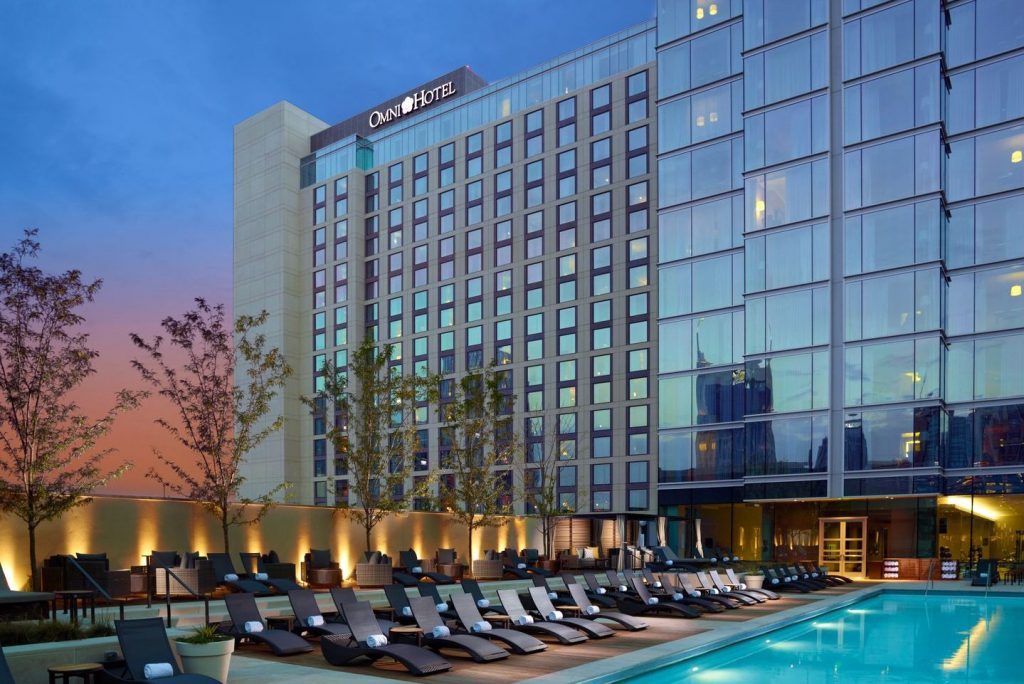Skift Take
Omni doubling down on luxury convention hotels at a time when major events aren't expected to return until at least next year is a risky move. But it could also prove highly successful if its long-view forecast actually pans out.
Omni Hotels & Resorts may seem like a particularly vulnerable hotel company, given the torpedoed conventions and events business during a global pandemic.
Yet company leaders say there is still plenty of runway for growth in convention hotels.
“We’re still bullish on convention hotels,” Omni President Peter Strebel said. “I do think group business is going to be the last to return. But, if anything, it will come back stronger.”
Dallas-based Omni banked much of its growth in recent years on group business travel and meetings, opening convention hotels in Fort Worth, Texas; Dallas; Nashville, Tennessee; and Louisville Kentucky over the last 11 years.
The hotel company is on track to open the 320-room, Nordic-inspired Omni Viking Lakes Hotel October 1 in Minnesota. The Omni Oklahoma City Hotel and Omni Boston Hotel at the Seaport — both convention-geared properties — are slated to open next year.
But it isn’t entirely growth mode at Omni.
The company is considering selling five hotels in a move Strebel said was underway before coronavirus tanked the hotel industry earlier this year and would position Omni for growth and opportunity on the other side of the hotel industry’s worst year on record.
“If we want to maintain our luxury positioning, there are some hotels by design and certain hotels in markets where it doesn’t make sense to put the capital in to bring the hotel up to Omni standards,” Strebel said. “There wouldn’t be [a return on investment] on it.”
Average rates at Omni’s targeted “upper upscale, lower tier of luxury” mix of resorts and convention hotels usually go well above $200 per night, Strebel said.
The hotels Omni may offload — the Omni Austin Hotel at Southpark, the Omni Dallas Hotel at Park West (not the convention hotel it opened in the same city in 2011), the Omni Houston Hotel at Westside, the Omni Jacksonville Hotel, and the Omni San Antonio Hotel at the Colonnade — are ones the company finds difficult to lift into the brand’s ideal standard.
“We looked at our portfolio and saw the majority of our portfolio is there or has the potential to be there through capital improvements,” he added. “We’ve got some hotels where Omni has grown up and changed, and we need to look to properties more in line of where our future is.”
The potential sale of the five Florida and Texas hotels could be construed as a way to offset losses at hotels geared at the kind of travelers industry analysts expect will be the last to return following the pandemic’s downward spiral on the travel economy.
But Omni remains focused on the meetings and events sector. If more companies decide to reduce their office footprint and have employees work remotely, there could even be a growth opportunity for a hotel company catering to group business travel.
“So many companies are no longer going to require people to work in an office,” Strebel said. “The need to bring people together for annual meetings and quarterly updates is going to be more important in the future than it was in the past.”
Dose of Reality
Strebel’s optimism doesn’t ignore the grim reality of the hotel industry.
While Omni is a private company and its financial performance is not public, the company’s typical average occupancy rate in the low 70 percent range cratered to a current 25 percent average due to the pandemic, Strebel said.
But he also maintains the company doesn’t have a lot of debt, had a profitable July, and expects August will see a similar degree of positive cashflow.
“We’re a company that can weather this storm, but it has hurt the business,” Strebel said.
The upper upscale and luxury space where Omni operates in the U.S. heavily depends on group business and convention business. A third of room revenue at these higher-end hotel sectors stems from group business travel, according to McKinsey & Co.
Analysts generally expect the business line won’t recover until event bookers are confident with the results of a coronavirus vaccine in wide distribution.
“There’s just a lot of influences that are going to dictate how or when those room nights come back,” Robert Mandelbaum, director of research information services at CBRE Hotels Research, told Skift in June. “The magic elixir for all forms of travel is a cure and/or a vaccine.”
Looking Ahead
Omni isn’t going to wait for a vaccine to continue with its growth plans for its three upcoming hotel openings and beyond.
Strebel, like other hotel executives, expects even more properties could be added to the portfolio by way of existing properties taking on an Omni flag — a transaction known as a conversion. He also anticipates a variety of growth opportunities to arise from distressed property sales.
“There are going to be a lot of hotels that come up for sale through foreclosure,” Strebel said. “The whole reason for selling these five assets is to reuse that capital on something newer and better that fits in with our brand.”
But while analysts wager whether the pandemic will result in a wave of high-profile mergers and acquisitions, Strebel maintains he’s focused more on organic growth at Omni.
“We’re a special mix,” he added. “Our brand can’t be all things to all people, so we have to be strategic in where we put our properties and what kind of customers we attract.”
Have a confidential tip for Skift? Get in touch
Tags: coronavirus, coronavirus recovery, omni hotels
Photo credit: Omni Hotels & Resorts isn't letting a global pandemic dim its outlook on developing convention hotels. Omni Hotels & Resorts
